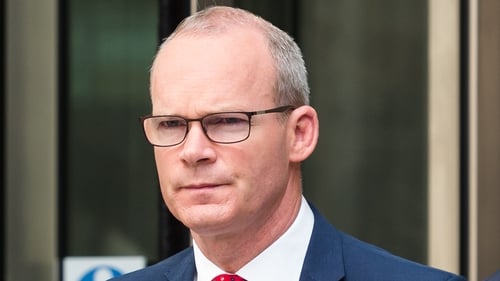
Checks on goods needed to protect EU market - Coveney
by Tony Connelly, https://www.facebook.com/rtenews/Tánaiste and Minister for Foreign Affairs Simon Coveney has said it was "clear" during the Brexit negotiations that there would be checks on goods coming from Great Britain into Northern Ireland, despite claims by Boris Johnson there would be no checks.
Speaking in Brussels, Mr Coveney said: "It was very clear when the deal was done."
The Tánaiste said there would be east-west checks on goods coming into Northern Ireland, while goods going west-east, from Northern Ireland to Great Britain, would be limited to export declarations.
"The EU has made it clear they want to minimise the impact on goods coming from GB into Northern Ireland, but at the same time goods coming from Great Britain into Northern Ireland will need to have some checks to ensure that the EU knows what is potentially coming into their market through Northern Ireland," he said.
"And, you know, we spent many, many hours of discussion in terms of trying to get that right."
He told reporters on the margins of a meeting of EU foreign ministers: "Goods going the other way from Northern Ireland into Great Britain will have far less requirement for checks at all, in fact, it will probably be limited to an export declaration because of course, that is a matter internally for the UK.
"The British government has indicated that they want frictionless or unfettered access for goods originating in Northern Ireland going into GB, into the rest of the UK single market.
"So, there was always a distinction between goods coming from GB into Northern Ireland versus goods going from Northern Ireland into GB and we spent many hours discussing and negotiating that, and I think explaining it too."
Mr Coveney said the final agreement was about trying to facilitate both sides.
It was about protecting the EU's single market and avoiding the need for physical infrastructure on the island of Ireland, but also to ensure that Northern Ireland remained in the customs territory of the UK.
It accepted it was a "complicated outcome and structure."
He said concluding a trade deal and other agreements with the UK by the end of 2020 was a "tall order".
Mr Coveney noted that Mr Johnson did not want to seek an extension to the post-Brexit transition period in which negotiations on a trade deal would be conducted.
The UK has to decide by July 2020 if wants to extend the period.
Mr Coveney told reporters: "There's an awful lot to do in a relatively short space of time...not just on a free trade agreement, but also on security, on fishing, on aviation, on data.
"There are loads of deals that will need to be negotiated and concluded and whether it's possible to do all that and ratify it in the space of ten or eleven months, I think that's a very tall order".
The Tánaiste said a Joint Committee involving officials from the EU and UK would put the practical arrangements in place.
Asked if it was disingenuous to say there would not be any checks, Mr Coveney said: "That's a matter for those who are involved in the debate in the UK. Our job is to make sure that we represent the deal that was negotiated accurately for people who ask.
"I would say the Irish Government's position is clear. The EU has always said it will work with the UK to try to minimise the impact on trade between Northern Ireland and GB - that effectively means unfettered access of goods originating in Northern Ireland going into GB, as well as unfettered access for goods in Northern Ireland entering the EU Single Market.
"So Northern Ireland is effectively getting the best of both worlds here, which is why I think it's a very good deal for Northern Ireland.
"But there are certain consequences in terms of the need for checks on goods travelling from GB into Northern Ireland because of the commitment, of course, to have an absence of any physical checks or infrastructure between Northern Ireland and the Republic of Ireland.
"I think that is very much the shape of what is a complex deal, but a deal that tries to take everybody's concerns into account."
The Financial Times today published a leaked DexEU paper which warned that the complexity of the Protocol arrangements for Northern Ireland cast doubt on Boris Johnon's claims that a free trade agreement between the EU and UK could be agreed by the end of 2020.
The document claimed that 98% of export businesses in Northern Ireland are "likely to struggle to bear the cost" of the extra paperwork, fuelling concerns of increased prices for consumers.